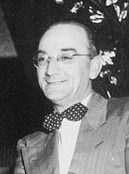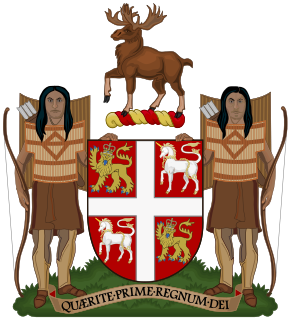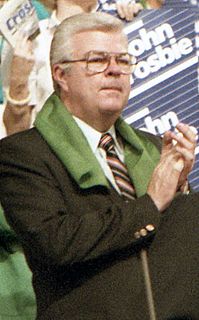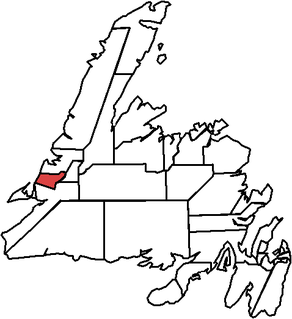
Joseph Roberts "Joey" Smallwood was a Newfoundlander and Canadian politician. He was the main force who brought the Dominion of Newfoundland into the Canadian Confederation in 1949, becoming the first premier of Newfoundland, serving until 1972. As premier, he vigorously promoted economic development, championed the welfare state, and emphasized modernization of education and transportation. The results of his efforts to promote industrialization were mixed, with the most favourable results in hydroelectricity, iron mining and paper mills.

The Newfoundland and Labrador New Democratic Party is a social democratic political party in Newfoundland and Labrador, Canada. It is a provincial section of the federal New Democratic Party. It was formed in 1961 as the successor to the Co-operative Commonwealth Federation (CCF) and the Newfoundland Democratic Party. The party first contested the 1962 provincial election. The party won its first seat in the House of Assembly in 1984 and has been represented in the legislature since 1990.

Frank Duff Moores served as the second premier of Newfoundland. He served as leader of the Progressive Conservatives from 1972 until his retirement in 1979. Moores was also a successful businessman in both the fishing industry and federal lobbying.

The Liberal Party of Newfoundland and Labrador is a political party in the province of Newfoundland and Labrador, Canada. The party is the provincial branch, and affiliate of the federal Liberal Party of Canada. It has served as the Government of Newfoundland and Labrador since December 14, 2015. The NL Liberals were re-elected to a majority government in the 2021 provincial election.

The Progressive Conservative Party of Newfoundland and Labrador is a provincial political party in Newfoundland and Labrador, Canada. The party was founded in 1949 and most recently formed the Government of Newfoundland and Labrador from the 2003 general election until the 2015 general election. The party has served as the official opposition to the government of Newfoundland and Labrador since 14 December 2015. On 31 March 2021, MHA David Brazil was appointed interim leader.
The Labrador Party was the name of two political parties in Newfoundland advocating the interests of the region of Labrador, Canada.
Beaton Tulk was a Canadian educator, civil servant and politician. He served as the seventh premier of Newfoundland from 2000 to 2001 as a member of the Liberal Party of Newfoundland and Labrador.

Alfred Brian Peckford, PC is a Canadian politician who served as the third premier of Newfoundland between March 26, 1979, and March 22, 1989. Peckford was born and raised in Whitbourne; before entering politics he worked as a teacher.

John Carnell Crosbie, was a Canadian provincial and federal politician who served as the 12th lieutenant governor of Newfoundland and Labrador, Canada. Prior to being lieutenant governor, he served as a provincial cabinet minister under premiers Joey Smallwood and Frank Moores as well as a federal cabinet minister during the Progressive Conservative (PC) governments of Joe Clark and Brian Mulroney. Crosbie held several federal cabinet posts, including minister of finance, minister of justice, minister of transport, minister of international trade, and minister of fisheries and oceans.
Edward Moxon Roberts is a Canadian politician and the 11th lieutenant governor of Newfoundland and Labrador.

Humber West is a defunct provincial electoral district for the House of Assembly of Newfoundland and Labrador. In 2011, there were 8,403 eligible voters living within the district.
The United Newfoundland Party was the name of two conservative parties in Newfoundland.

The 2007 Newfoundland and Labrador general election was held on October 9, 2007 to elect members of the 46th General Assembly of Newfoundland and Labrador.

The 1971 Newfoundland general election was held on 28 October 1971 to elect members of the 35th General Assembly of Newfoundland. It resulted in a hung parliament as, with the support of the Labrador Party's lone MHA, the Smallwood government had the support of 21 MHAs compared to 21 for the Progressive Conservative party. Smallwood ultimately resigned in January 1972 allowing Moores' Tories to form a government but the instability in the House led to the March 24, 1972 provincial election.

The Canadian province of Newfoundland and Labrador is governed by a unicameral legislature, the House of Assembly, which operates under the Westminster model of government. The executive function of government is formed by the Lieutenant Governor, the premier and his or her cabinet. The politics of Newfoundland and Labrador is defined by a long history, liberal democratic political institutions and a unique political culture.

Yvonne Jean Jones is a Canadian politician in Newfoundland and Labrador, who was elected to the House of Commons of Canada in a by-election on May 13, 2013. She represents the district of Labrador as a member of the Liberal Party caucus. On December 2, 2015, she was appointed Parliamentary Secretary to the Minister of Indigenous and Northern Affairs. Jones is a member of NunatuKavut.
Leo Denis Barry is a Canadian jurist and current Justice of the Court of Appeal of Newfoundland and Labrador. He was born in Red Island, Newfoundland and Labrador.
Noel Francis Murphy was a physician, broadcaster and politician.

Clyde Kirby Wells, was the fifth premier of Newfoundland from 1989 to 1996, and subsequently Chief Justice of Newfoundland and Labrador, sitting on the Supreme Court of Newfoundland and Labrador from 1998 to 2009.
James Joseph Louis (Jim) Greene was the Newfoundland and Labrador's Opposition Leader from 1960 to 1965 and leader of the Progressive Conservative Party of Newfoundland. He led the party through the 1962 provincial election in which the party increased its seat total in the Newfoundland House of Assembly from 3 to 7, more than doubling them, and its share of the popular vote from 25% to 36%. The result was not enough to prevent the Liberal government of Joey Smallwood from returning to power with a substantial majority government.









